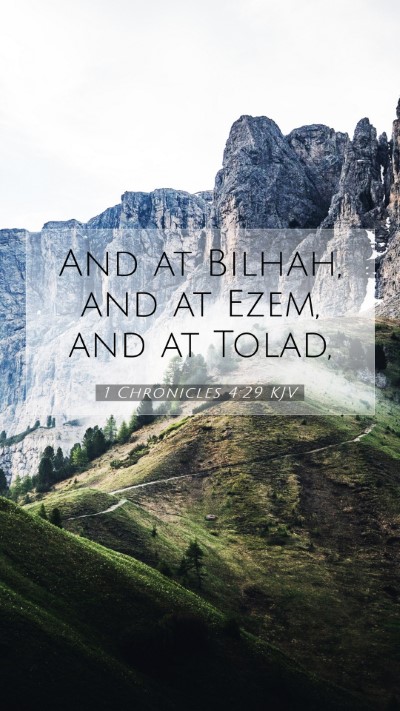1 Chronicles 4:29 - Bible Verse Meaning and Interpretations
Verse: 1 Chronicles 4:29
(The verse states: "And the names of the sons of the priests: the sons of Ahitub; Abiathar, Ahimelech and Ahijah, son of Ahitub.")
Overview
1 Chronicles 4:29 serves as a part of genealogical records found in the Chronicles, which highlight the lineage and significance of various families in Israel’s history. This specific verse mentions the descendants of the priests related to Ahitub, focusing on prominent figures such as Abiathar, Ahimelech, and Ahijah. Understanding this scripture aids in the greater comprehension of the priestly line and its importance during biblical times.
Insights from Commentaries
Matthew Henry's Commentary
Matthew Henry emphasizes the importance of these genealogies as a reminder of God’s faithfulness through generations. The mention of Ahitub's sons stresses the continuity of divine purpose in the priestly lineage. By archiving these names, the text illustrates how God upholds His covenant with Israel, ensuring that faithful leaders are passed down through families.
Albert Barnes' Notes
Albert Barnes notes that the listing of these priests serves as a part of the broader narrative to affirm the validity of the priestly order established by God. He highlights that Abiathar was known for supporting David, while Ahimelech faced tragic circumstances under Saul’s reign. This context underscores the trials and tribulations that the priestly line endured while remaining faithful to their calling.
Adam Clarke's Commentary
Adam Clarke provides detailed historical backgrounds for each character mentioned in the verse. He elaborates on the roles of Abiathar, Ahimelech, and their significant contributions to the religious life of Israel. Clarke also points out that the record serves not just for lineage but as a testament to God's providence in maintaining His priests amidst political turmoil.
Key Themes and Applications
- The Importance of Faithfulness: This verse is a reminder of the commitment to your calling, as seen in the lives of Ahimelech and Abiathar.
- Legacy and History: The genealogical records emphasize the value of understanding one’s heritage in faith.
- God’s Sovereignty: The continuity of the priesthood speaks to God’s overarching plan and His preservation of a faithful remnant.
Cross References
- 1 Samuel 21:1-9 - Highlights Ahimelech's interactions with David and the consequences that follow.
- 1 Chronicles 24:3 - Further elaboration on the divisions and roles of the priests.
- Hebrews 7:11-17 - Discusses the new priesthood established through Christ, contrasting it with the Levitical order.
Conclusion
1 Chronicles 4:29, while a genealogical account, offers profound insights into the ongoing legacy of faith within Israel. Through the perspectives given by Matthew Henry, Albert Barnes, and Adam Clarke, we gain a multifaceted understanding of this verse's importance. It serves as a testament to God’s continued engagement with His people, the sustaining power of lineage in faith, and the divine orchestration of spiritual leadership.
Study Resources
For those interested in deeper exploration, consider utilizing various Bible study tools and online Bible study courses. Engaging in Bible study groups can also facilitate discussions on biblical exegesis and help uncover deeper meanings in scripture.
Further Learning
To better understand difficult Bible passages, look into resources like Bible study guides and engage with lessons that focus on how to interpret Bible verses. This can shed light on the historical context of verses like 1 Chronicles 4:29 and enrich your Bible study insights.


